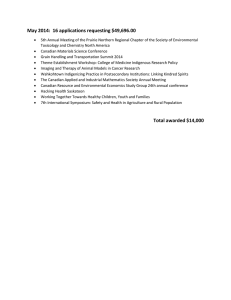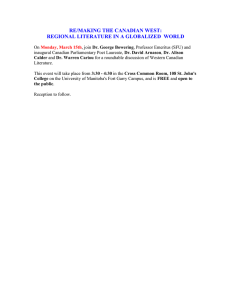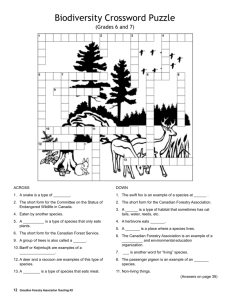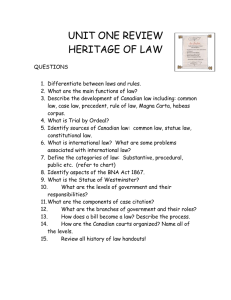GEOGRAPHY 369: CANADIAN FIELD STUDIES, 2009 EVALUATION
advertisement
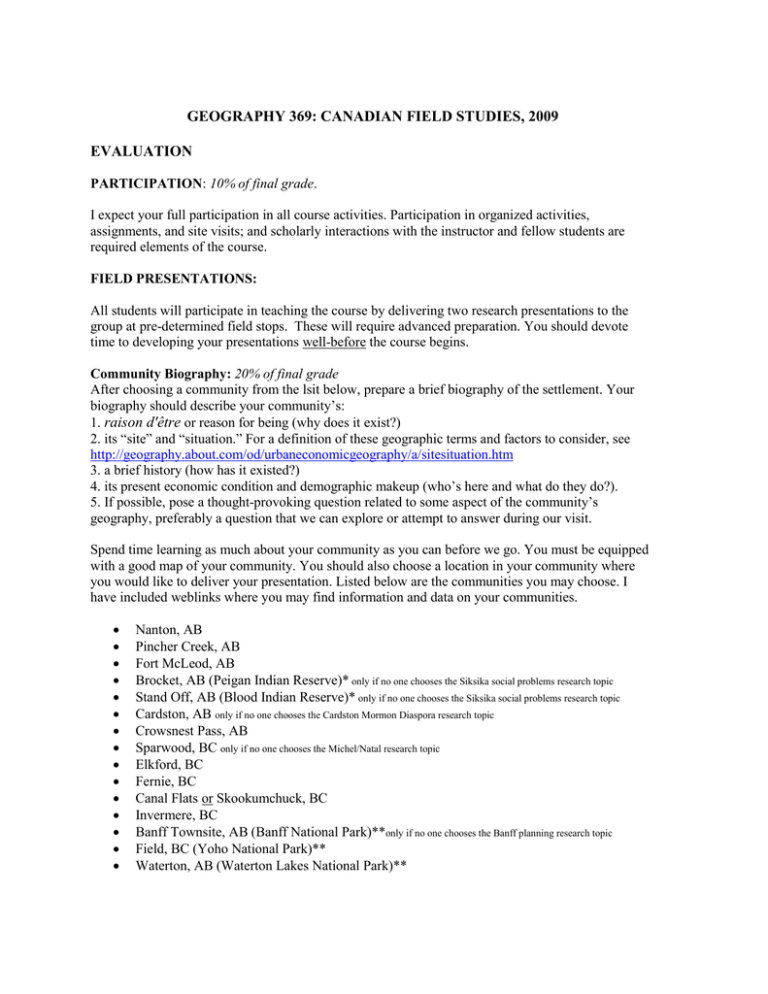
GEOGRAPHY 369: CANADIAN FIELD STUDIES, 2009 EVALUATION PARTICIPATION: 10% of final grade. I expect your full participation in all course activities. Participation in organized activities, assignments, and site visits; and scholarly interactions with the instructor and fellow students are required elements of the course. FIELD PRESENTATIONS: All students will participate in teaching the course by delivering two research presentations to the group at pre-determined field stops. These will require advanced preparation. You should devote time to developing your presentations well-before the course begins. Community Biography: 20% of final grade After choosing a community from the lsit below, prepare a brief biography of the settlement. Your biography should describe your community’s: 1. raison d'être or reason for being (why does it exist?) 2. its “site” and “situation.” For a definition of these geographic terms and factors to consider, see http://geography.about.com/od/urbaneconomicgeography/a/sitesituation.htm 3. a brief history (how has it existed?) 4. its present economic condition and demographic makeup (who’s here and what do they do?). 5. If possible, pose a thought-provoking question related to some aspect of the community’s geography, preferably a question that we can explore or attempt to answer during our visit. Spend time learning as much about your community as you can before we go. You must be equipped with a good map of your community. You should also choose a location in your community where you would like to deliver your presentation. Listed below are the communities you may choose. I have included weblinks where you may find information and data on your communities. Nanton, AB Pincher Creek, AB Fort McLeod, AB Brocket, AB (Peigan Indian Reserve)* only if no one chooses the Siksika social problems research topic Stand Off, AB (Blood Indian Reserve)* only if no one chooses the Siksika social problems research topic Cardston, AB only if no one chooses the Cardston Mormon Diaspora research topic Crowsnest Pass, AB Sparwood, BC only if no one chooses the Michel/Natal research topic Elkford, BC Fernie, BC Canal Flats or Skookumchuck, BC Invermere, BC Banff Townsite, AB (Banff National Park)**only if no one chooses the Banff planning research topic Field, BC (Yoho National Park)** Waterton, AB (Waterton Lakes National Park)** Community Weblinks and Data: Statistics Canada Census (http://www.statcan.gc.ca/);check 2001 Community Profiles; ePodunk Canada (http://ca.epodunk.com/); and Google search. *Aboriginal Communities: Try Indian and Northern Affairs Canada http://www.aincinac.gc.ca/; Statistics Canada Census (http://www.statcan.gc.ca/); ePodunk Canada (http://ca.epodunk.com/);and Google search. ** National Park Communities: Try Parks Canada (http://www.pc.gc.ca/); Statistics Canada Census (http://www.statcan.gc.ca/); ePodunk Canada (http://ca.epodunk.com/);and Google search. TOPICAL PRESENTATION: 30% of final grade. I expect that you will be able to engage the group for at least 20 minutes. Your presentation may be enhanced by the use of handouts, maps, group activities, site tours, etc. Be as innovative as you like. I will assist you in finding research sources and provide you with suggestions for your presentations. The best presentations will be data oriented and interpretive (rather than merely descriptive). Choose one research topic. I am also open to original ideas for potential topics. Physical/Environmental Geography 1. Biodiversity and Park Expansion in Waterton Lakes National Park 2. Fire, Pine Beetle and Forest Ecology in Kootenay National Park 3. Wildlife Biogeography in the Canadian Rockies: Grizzlies in Banff NP 4. Glacial retreat and Climate Change: Evidence from the Columbia Icefields/Athabasca Glacier 5. The Columbian Forest Biome and Forestry in Fernie, BC 6. Where the Wind Blows: Wind Power Generation in the Pincher Creek District 7. In the Shadow: The Frank Slide and the BC Avalanche Threat 8. Navigating Big Hill: The Spiral Tunnels and Mount Stephen avalanche zone 9. An Environmental Assessment of Castle Mountain Ski Resort 10. Environment Impacts of Open Pit Coal Mining: Fording River and Greenhills mines Cultural/Historical Geography 1. Geochache Backlash: Geocaching in National Parks and Alberta/BC Provincial Parks 2. Cardston and the Canadian Mormon Diaspora 3. The Hutterites: The Amish of the North (focus on Alberta and the Pincher Creek Colony). 4. The Siksika (Blackfoot) Nation a historical geography (traditional lifeways, treaties and reserves) contemporary socioeconomic problems anthropomorphic maps 5. Company Town Abandonment: Michel/Natal and Sparwood 6. The Canadian Pacific Railway and development of Banff National Park 7. Urban Planning in Banff: Development Pressures in Canada’s Oldest National Park 8. The Ghostrider: Fernie’s Story of Coal and Disaster 9. Hot Springs Tourism in the Canadian Rocky Mountains 10. Alberta’s Historic Grain Elevators: The Demise of a Prairie Icon (focus on Nanton) 11. Fernie Sub-Cultures: From Italians to Bohemians 12. David Thompson: North America’s Greatest Explorer/Cartographer/Geographer? DAILY FIELD JOURNAL: 40% of final grade. You will compile a daily field journal that will be submitted for grading after our return to Geneseo. You are asked to devote time to writing in your journals everyday during the field course. You should average at least two pages of text per day of travel. Your journals may be supplemented with maps, figures, sketches, photographs, or any other pertinent material you collect. Items you should discuss in your daily entries include: A brief Description of Travel: an account of stops, activities, and points of interest. Interpretation of Geographic Phenomena: observe, describe, and interpret the physical and cultural landscape. Attempt to move beyond description and provide some type of explanation of observations. This may include reference to material in your Summer Readings handouts. You might also think about conducting some type of observational experiment, proposing hypothesis, or merely providing speculative explanation; connecting field observation to coursework you have taken or things you have read; or, even providing commentary on how your observations fit your preconceived ideas regarding the areas visited—did your experience match expectation? Personal Reflection: Your daily field journals should also contain personal reflection on what you learned, what you enjoyed, what bothered you, what confused you, what questions remain unanswered, what stood out about your day and why? Please feel free to provide commentary about the successes and failures of the field trip, whatever they may be. This provides me with important feedback. Do not, however, allow this material to overwhelm your journal—if you would like to share personal entries with me that is OK, but your field journal should not be dominated by diary-like entries. TRIP DETAILS TRAVEL: the class begins on Aug 3 and ends on Aug 16. These are your travel dates to and from Calgary. I will pick you up at the Calgary airport. This is a ticketless reservation. Check in at the airport at least 1.5 hours in advance of your departure. Here is your flight info: Aug 3 Buffalo 1:25 pm - flight United #7238 arrive Chicago 2:11pm Depart Chicago 2:55 pm - flight United #6763 arrive Calgary 5:49pm Aug 16 Calgary 7:35am - flight United 5856 arrive Chicago 11:54am Depart Chicago 2:15pm - flight United #794 arrive Buffalo 4:47pm ROOM AND BOARD: We will be staying in hotels/motels and hostels. Please note that you will be sharing your rooms and sleeping areas with others. In all cases, males and females will have separate accommodations. Do not bring a sleeping bag—in fact, most of our hostels will not allow you to use them. I do suggest that you bring a towel. We will have kitchen facilities in every locale except the first and last nights. You will be required to pay for your own food, but expenses can be minimized by cooking meals yourself and by sharing meal expenses. WHAT TO BRING: We will be travelling in a 15 passenger van and space is limited. Please pack lightly and do not bring hard cover luggage—it is too difficult to squish into the back of the van. Use soft luggage—something squishable like a duffle bag or backpack. Although I would like you to pack lightly, you will need clothing for a full range of weather conditions. Temperatures could range from the lower 40s to mid 90s. Expect 65 to 85 degree weather. Lots of sun should be expected, but rain is also a possibility. In the mountains, nights will be noticeably cool. You will not need any fancy clothes. Here are my recommendations for items you should bring. 1 2 2 1 6-8 1 1 1 1 1 day pack pairs of jeans/pants pairs of shorts bathing suit T-shirts socks and unders heavy sweater / fleece jacket waterproof windbreaker hat and shades pair of good walking shoes (sturdy running shoes or hiking boots) pair of sandals towel blank Field Journal camera sunscreen water bottle IDENTIFICATION: you must have a Passport to travel to Canada! Make a copy of the first two pages of your passport and give it to me when you arrive in Canada. Should you lose your passport, the process of obtaining a new one is easier if you have a copy of the original. By now you should have checked that your passport is valid beyond the date of your return to the US. Check that your passport is signed. HEALTH INSURANCE: Make a copy of your health insurance documentation (card). Give me the copy when you arrive in Canada. EMERGENCY CONTACT: I will be asking you to provide me with a name and telephone number of someone to contact in the US in case the need arises. COMMUNICATION: The itinerary I will give you lists phone numbers and addresses for each place we are staying. Please pass this on to your parents or guardians. You will have access to a telephone every evening but you will not have regular access to e-mail. You may bring a cellphone, but reception will be sketchy at times and you may also face significant roaming fees—be warned. Phone cards work well to keep telephone costs down. I will also be asking you to provide me with summer contact info (email and phone) so that I know the best way to get a hold of you in the months preceding departure. MEDICATION AND PRESCRIPTIONS: If you are taking medicine regularly make sure you have enough medicine for the entire stay. Many prescriptions are for thirty days, so make sure you have enough. Don’t combine medications in one bottle. Keep them in the original containers. If you are prone to sinus problems, allergies, stomach problems or whatever, bring anything that you think you might use. If you have any medical condition that you think that I should know about, i.e. food allergies, bee sting reactions, low blood sugar, depression, anxiety disorders etc. then please get in touch with me in advance. MONEY: I suggest that you bring a small amount of US cash ($75) to use in an emergency; if you have a temporary problem finding an ATM machine; or for your return trip home. Canadian merchants will almost always accept US cash but they will usually take advantage of you on the exchange rate. To obtain Canadian money, it is best to simply use your debit card to withdraw Canadian cash once you have arrived in the country: major American ATM network cards, those with major credit card seals like VISA, will work in Canadian machines and the exchange rate on transactions is usually very good. No need for traveler’s cheques. Before you leave the US you should check the expiration date on your cards. If the magnetic strip is starting to wear, get a new card. Don’t wait for it to be rejected abroad. ALCOHOL: The legal drinking age in Alberta is 18 years, in BC it is 19 years. I expect that you will follow the law, use good judgment, and not cause alcohol-related problems for yourself or your classmates. Disruptive behavior that affects your participation in the course, or the experiences of others, will not be tolerated. If drinking becomes a problem you will be asked to leave the group, find your own way home, and you will receive a failing grade in the course. Checklist: before you leave Geneseo for the Summer Have you paid Study Abroad? Do you have a PASSPORT? Does Robertson have your personal contact information for the summer? Have you discussed your research plans (community and topical presentations) with Robertson? Do so before you leave Geneseo for the summer! Do you have any special issues or concerns (ie. health issues, dietary constraints, bear phobias, etc.) that you need to make Robertson aware of before we leave? We can talk one on one. Are you approaching the field trip with an exceptionally good attitude? Your classmates, with unauthorized boxer nicknames and email: Alicia “Diesel” Dezik (amd14) Chris “Boom Boom” Bartell (ctb1) Cara “Killer” Kowalski (clk9) “Hurricane” Hunter Rainford (htr1) “Calypso” Carl Eppers (cee6) Kate “Terminator” Tubbs (cbt1) Emily “Full Moon” Froome (erf3) “Kick’n” Katie Conley (cwc4) “Upstate” Nate Kopp (nfk3) Christy “Oredigger” Olson (cmo8)
